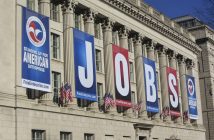Not for nothing is economics called the dismal science. Progressive journalists are its dreary, credulous handmaidens.
So it was fitting that Britain’s Economist magazine again took to lecturing the “rich world” on immigration policy last week.
“Among economists, there is near-universal acceptance that immigration generates huge benefits for migrants,” espoused London’s font of “classical liberalism” and open-borders capitalism.
That may seem obvious enough. But (there’s always a “but” in economic journalism) the allegedly broad pro-immigration consensus is badly cracked.
In pushing its “progressive case” for unfettered migration, the Economist ever-so-briefly acknowledges that the income gap between developed and developing nations is shrinking.
But the Economist and the economists are wrong in concluding that immigration is the key to economic prosperity in the West. Importing people from the Third World doesn’t make us more prosperous, and it won’t fix the problems in their homelands.
Last year, Economist writers got around to wondering about the effect low-wage immigrants have on incomes in receiving nations. “It’s perhaps one of the most important questions of labor economics,” they averred. Then they punted: “It’s also one that is largely unanswerable.”
Is it? We don’t think so, as FAIR wrote earlier this month.
The inability of the Economist — and establishment economists at large — to shake off political orthodoxy and objectively assess legal and illegal immigration isn’t lost on the discerning public. Citing the magazine’s absence of reporting on rising social-welfare costs associated with migrants, one reader noted: “The Economist continues to parrot the leftist line that all immigration is good and therefore we must have much more of it.”
Similar reporting deficits exist on this side of the pond. Per a disgruntled New York Times reader:
“While the NYT excels in presenting the perspective of illegal immigrants, it is negligent in giving the views of those negatively impacted. Consequently, many of its readers are surprised when Donald Trump rides this issue to the front of the polls. Yet, when given the chance to discuss why illegal immigration has become such a major political draw for so many people, the Times spends one column after another attacking Trump’s personality.”
All the news that’s fit to print? Like we said — dismal.





2 Comments
So they can say that “there is near universal acceptance that immigration generates huge benefits for migrants”. But it’s “unanswerable” if it affects incomes in the nations they go to. So why did the American middle and working classes do so well in the 50s 60s and 70s and union membership hit it’s peaks, when immigration rates for those years were a fraction of now. And the mass immigration of the past 30 years has seen a parallel and significant decline in the relative wages and benefits of workers.
If it’s just a coincidence, it’s up to them to explain why. And they can explain why California, the state with the largest number of immigrants, by percentage and total, has the highest poverty rate in the country when adjusted for cost of living. You may make twice as much there as Mississippi, but it costs you four times as much to live the same lifestyle.
They also say that to claim that many immigrants don’t share the same liberal Western values as the nations they move to is false. Muslim majority nations are repressive, misogynistic, and intolerant of other religions. To deny that is ridiculous. That’s why many in Europe demand sharia law.
Bingo!